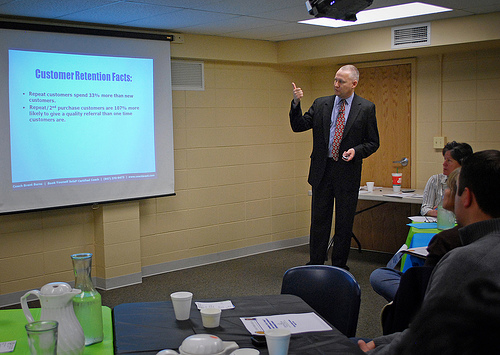I saw a recent post at womenonbusines about how important it is for small business owners to seek out public speaking opportunities- even if those opportunities are unpaid. I couldn’t agree more.
With all the emphasis these days on online social networking and hyper-connected, mobile technology, still nothing beats a face-to-face meeting. In the business world, as in other areas of life, the human contact factor weighs heavily, and can create a bigger, more lasting impression on potential customers and business partners.
But if the thought of getting up to speak in front of a group of people leaves you feeling a little weak in the knees, then consider these tips:
1. Most important rule… be yourself!!! Don’t try to be something you are not. My general rule: get to know your public speaking strengths and weaknesses. Where necessary compensate for weaknesses, but put more emphasis on building on your natural strengths and abilities.
Everyone has talents and/or abilities that are unique to them. The first place to start is to get in touch with them. Some people are funny… Some people speak very clearly and logically… Some people are charismatic and can work up a crowd… Some people are sensitive and can feel where their audience is holding… Each one of these abilities can be used to connect with the people who have come to listen to you speak.
2. Don’t go overboard with public speaking “techniques.” There are many, many public speaking techniques designed to make the experience more interactive and engaging for your audience and to keep you on track (for example, the use of visual aids, humor, outlines, etc). While they each have importance, keep in mind that you do not need to use all of them to be a good speaker. They are meant to cover up small “deficiencies” in your presentation and to enhance your natural abilities. If you are in touch with your strengths and weaknesses as a speaker then it will be easier to pick out which techniques to use and to decide how and when to use them.
3. Do your homework before hand. Though many public speaking advisers emphasize thoroughly knowing what you are speaking about and the message you want to give over, don’t forget to also learn about who you are speaking to (i.e. what are their interests? Ages? Are they there voluntarily or are they forced to be there?) as well as when ( i.e. In the morning? At the end of a long day?) and where you are speaking (i.e. What is the size and layout of the room?). All of these factors should influence the way you will deliver your presentation.
4. Rehearse your presentation. If you have time and a listening ear you can practice giving over your presentation to someone and ask for feedback. You can alternatively record yourself speaking, whether via an audio recording or video tape. What this does is puts you in your audience’s point of view so that you can get an idea of what their experience will be like and make any necessary adjustments.
5. Get some perspective. Unless you are making a career of public speaking, most speaking engagements begin and end within an hour and they may be clustered around certain times of the month or year. Even if you make mistakes during your presentation and even if it was a difficult experience (which happens to even the best of public speakers), the engagement will come to a close and life will go on (even if it doesn’t feel like that at the moment!). Just try your best and try to let yourself shine through. In the end, it’s what counts the most.

